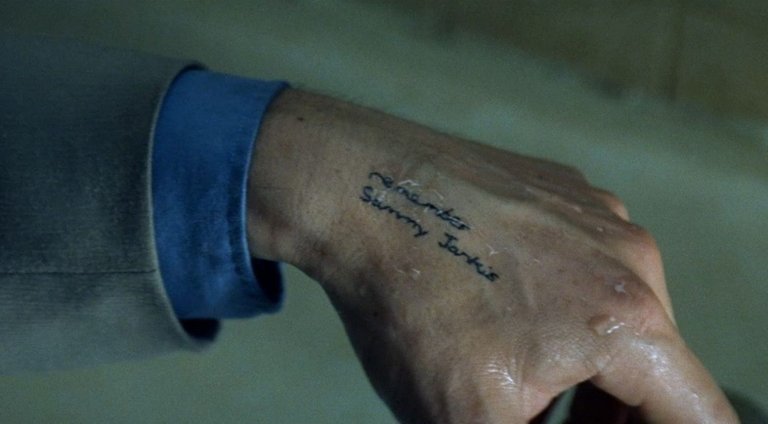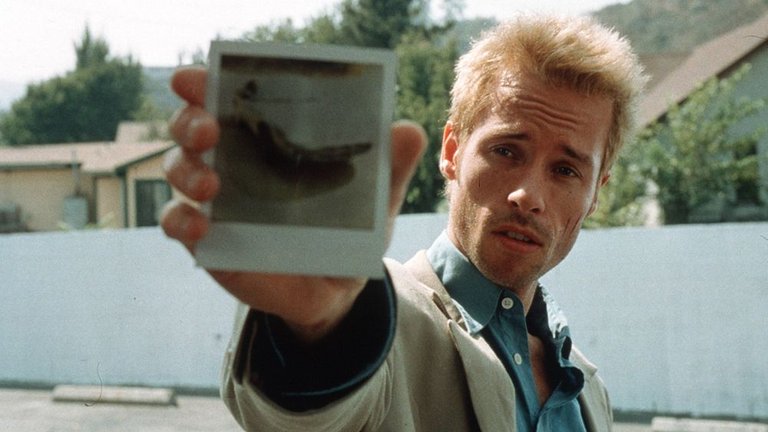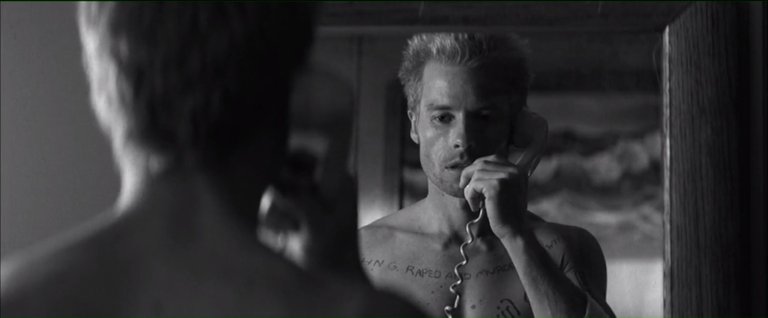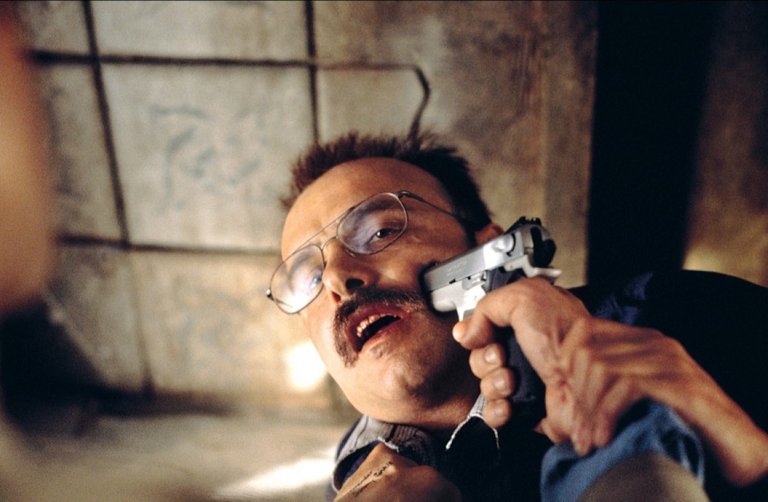Leonard Shelby, in black and white and voice-over, in his motel room.
Leonard Shelby, in color, leaving a motel and going with Teddy to an isolated house where the former will shoot the latter.
Why? Because it was marked on a polaroid.
Moreover, we quickly realize that Leonard follows with attention and precision the instructions marked with a black marker on his polaroids.
And the instructions marked on his body, tattooed on his arms, his chest, his legs, etc.
Leonard Shelby is a real book, bound in skin.
He needs to see it all.
Because he has a vengeance to exact.
And that, every five minutes, he forgets.

After a trauma, Shelby loses his immediate memory. He says it himself when he talks to the motel manager: "If this conversation goes on too long, I won't know how it started". And since Leonard Shelby is on a murderous quest to find his wife's killer, he needs memory. Unable to find it in his head, he spreads it on his body.

Memento is the second feature film by Christopher Nolan. The film is based on two principles: the recurrent amnesia of the character, and a daring backwards construction.
For Memento is constructed in a succession of sequences of about five minutes that are edited backwards. We start with the end, then the five previous minutes, and so on, and we finish with the beginning.
An original construction in appearance, certainly, and which requires a certain time of adaptation. But one gets used to it quickly enough and, finally, one finds the usual codes of the genre. For example, the first twenty minutes are devoted to some boring chatter to introduce the situation of the main character. So, finally, the major interest of the film is not here.

Or, to be more precise, if the film had been limited to the simple exploitation of such an idea, it would have turned short rather quickly. But the script will play on the potentialities offered by the character's amnesia. Instead of doing what normal films about amnesia do (I investigate to find out who I am, where I come from, etc.), Nolan will play on the dark areas hidden in Shelby's immediate past. He creates certainties in order to make us doubt them. Nothing is certain, so everything is doubtful, starting with the characters. Natalie: ally or manipulator? Or both?
What was a certainty in one sequence is completely dismantled in the next sequence (which, in fact, takes place just before: did you follow?). The spectator is thus put in a situation where he doubts completely everything that happens. Even the polaroids hide potential lies, since an image depends on its interpretation (very DePalma, as a thematic).

Memento, more than a film about memory, is therefore a film about manipulation. Many people play on Shelby's disability to make her believe and swallow anything and everything, from the manager who makes her pay for two rooms (because Shelby forgot she had already taken one) to other more serious cases (which I will not mention here for obvious reasons).
The backward construction is not a simple narrative technique, it fully participates in the suspense and contains a whole scenaristic stake. First we have the effects, and Nolan surprises us by showing us that the cause is different from what we thought.
The realization is correct but without making sparks either. The beginning is rather talkative and sometimes too much emphasis is put on the character's infirmity (see this Sammy jankins story, which has no other interest than filler). Fortunately, the pace picks up and the sequences get shorter, giving a more nervous impulse towards the middle of the film.

I personally loved this film. For all the reasons mentioned above of course, but also for the unforgettable atmosphere of the film. Nolan managed to convey this world inside another world, having its own identity, its own rules and constraints. This world inside another world is easily transposable to our personal situations. It moved me. What about you?
Memento is an excellent movie. I have it on DVD, I have to see it again, all its narrative structure is great, at the time it caused a furor in the specialized critics.
I think you forgot to put the sources of the images, when you can edit the post and put the sources.
Amazing movie, Nolan changed the rules of storytelling since his humble beginnings.
It's a work of art, that is for sure. It is also a completely preposterous situation though. Just get a whiteboard, no need for tattoos, especially since some of those tats would have taken more than one day to complete :P
Hi!
My favorite Nolan film. I think it's a great narrative genius to present the story in segments that follow each other in reverse, this puts the viewer in the same situation as the protagonist with respect to what is happening: what am I doing here? who are these guys? is he good or bad? Nolan wants you to be confused, to feel the uncertainty that his character suffers. It's a great movie.
Good review.